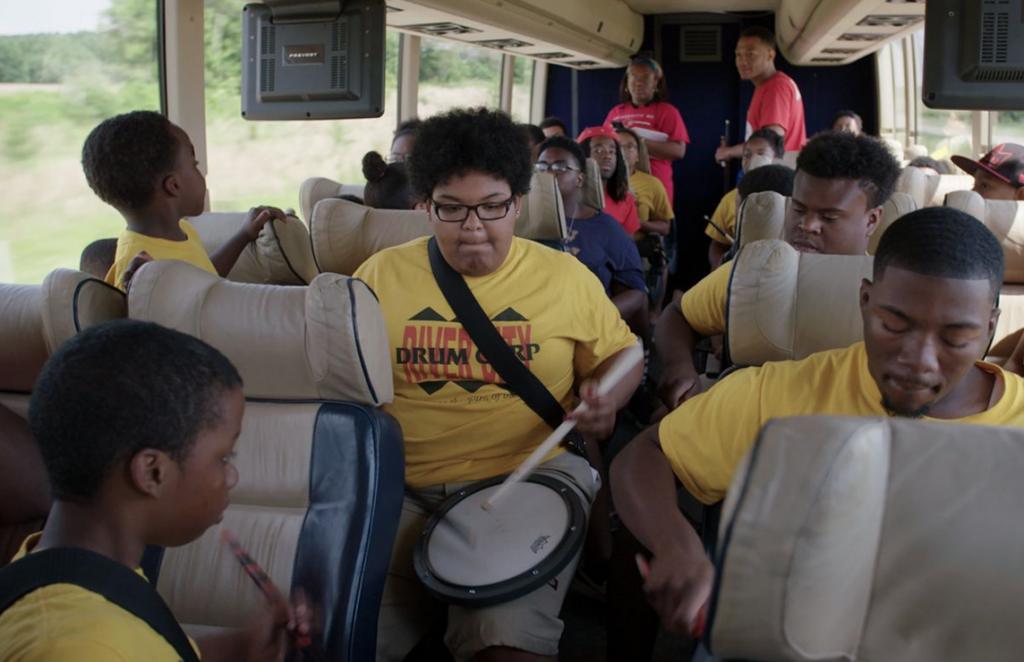RIVER CITY DRUMBEAT is a powerful story of music, love, and legacies set in the American South. Edward “Nardie” White devoted his life to leading the African-American drum corps he co-founded with Zambia Nkrumah in Louisville, Kentucky three decades ago. Together they inspired youth from their West Louisville neighborhood to thrive by connecting them with the art and cultural traditions of their African ancestors. Now Albert Shumake, whose destiny was shaped by the drumline, must take up the mantle for the next generation. Meanwhile, student drummers Imani, Jailen, and Emily navigate adolescence and life changes. RIVER CITY DRUMBEAT follows this creative community of mentors, parents, and youth making their way in a world where systemic forces raise obstacles to fulfilling their dreams.
SFF Program Director Jeff Schmidt spoke with Directors Marlon Johnson and Anne Flatté ahead of the festival - RIVER CITY DRUMBEAT screens during Week 2 (Friday, July 17 - Thursday, July 23) of our virtual Salem Film Fest and tickets can be purchased here.
Jeff Schmidt: How did you become familiar with the River City Drum Corp and what convinced you to make your film?
Marlon Johnson: The film was inspired by the tireless work of the founders and current leaders of the River City Drum Corp (RCDC). Anne and I were connected to this story through producer Owsley Brown, who was raised in Louisville, and is dedicated to independent documentaries that explore the power of art and music. We all observed the impact RCDC was having and the role they were playing in saving the lives of kids in the community of Louisville. The power of the arts to steer one’s own life toward the best version of themselves is exemplified in this film. Often, art films involving youth follow a competition model, however we wanted to take an emotional, narrative approach that more closely aligned with River City Drum Corp’s non-competitive philosophy. Mr. White has taken the long view when it comes to his corps members -- building up their inner leadership and life skills so they can go on to carry those lessons into the rest of their lives. As a result, the drum corps is a strong tree rooted in African-American culture, and its members and alumni are the fruit of that tree. When we met Albert Shumake, the new leader of the corps, he was juggling a number of roles and personal milestones. He was a new father, his mother was gravely ill, and he wanted to continue working as a DJ and an artist while stepping into the very large shoes of Mr. White. His was a compelling, relatable story arc about identity, legacy, and duty. It has been a joy and a journey making this film over the last few years with the drum corps community. Their stories resonate deeply with my own experience of growing up in Miami and finding my path through the saving grace of the arts.
Anne Flatté: I’ve always been drawn to stories about artists and how they create art to both interpret and shape the world inside them and around them. As a parent of two children, I have come to understand and appreciate the work that is required to raise children by not just immediate family but an extended community of caring adults, teachers, and mentors. These themes are at the core of River City Drumbeat. When Marlon and I first met Mr. White, he shared some very intense stories about his life and work, as well as the fact that he was at an important crossroads and in his final year at RCDC. All of us felt this film had to happen before he moved on.
JS: It's obviously a crucial time in our nation's history to recognize and remedy the unfair challenges in society that African-Americans and people of color face every day, can you talk about how you approached making RIVER CITY DRUMBEAT and your storytelling approach?
MJ: As an African-American who has experienced a lot of the same things, I wanted to explore the complexities of a community like the drum corps in a way that felt true to me. So often these communities are presented in a monolithic way which is often overwhelmingly negative. There are far more other truths than those so often presented to audiences. I also think it was meaningful for the participants in the film, who actively cultivate mentors within their community, to see someone who looked like them who is a working artist in a leading position.
AF: From the beginning, we were very clear with ourselves that this was a collaboration with Ed White and Albert Shumake in telling their life stories and the story of RCDC, and they helped us every step of the way. We had a very small crew, never more than four including Marlon and me. I think because they are both artists they understood the process and us figuring it out and following our instincts and our visions. Also, we all enjoyed being in each other’s company. There was a lot of trust, built with a lot of conversations that were not filmed, and a lot of communication at all stages of production that continues now during distribution. Marlon and I are very committed to developing the documentary art form and language, including the terminology, production, and expression on the screen.

JS: What has been the response from film festival audiences to the film? And how about the drum corp themselves?
MJ: Last fall we screened the film to Ed White, Albert Shumake, Ed Hamilton, the seven “seniors” and many more from the RCDC community. It was an incredible honor to be there with them and then hear how much they loved the film. People stood up after and spoke about how they felt to see their stories represented in a way that felt real to them. I will never forget that incredible moment. We were very happy with their very positive response to the film. Since then we have screened for other community groups and at festivals and the conversations afterwards are always fantastic.
AF: It has been truly wonderful to see how the film moves audiences emotionally, and how they feel connected with the film’s protagonists, either because they recognize a community familiar to them, or because they connect with the spirit embodied by the West Louisville community they get to know. We were very fortunate to get to premiere the film in the fall to audiences in theaters before the pandemic, and feel the emotional energy in the room. Since Covid and going virtual, we have been able to participate in Zoom Q&As with community groups who have seen the film, and people have shared their feelings in these online conversations. We have also received a lot of messages and emails from people who have been moved to tell us how the film affected them deeply, and they have given us many beautiful responses, some of which appear on our website.
JS: I was really moved by the handing over of the leadership baton from Edward "Nardie" White to Albert Shumake - can you talk about their relationship? There are a lot of powerful and emotional moments with those guys.
MJ: They have a father/son type relationship that was fostered and flourished over many years, and also has many complicated layers. There was also a mutual recognition from one artist to the next that was really satisfying to see. Mr. White saw himself in Albert and cultivated the artist within him, and at the same time had really high expectations of his successor. It’s a loving relationship, but also a relationship of tough love. There is also a tradition in the African-American community of deep respect for one's elders; a tradition which predates our arrival to the Americas. This was also apparent in Albert’s regard for his mentor.
AF: We were definitely interested in this founder/successor dynamic, where the very circumstances and qualities that create a successful founder can also make it very difficult to pass the baton successfully. It was very difficult for Mr. White to put the burden down after carrying it so many years, but he knew what needed to happen, that he needed to begin the next chapter of his life.
JS: What would you like audiences to take away from your film?
MJ: We hope this deeply personal story of cultural connection and determination, challenged by the reality of this country’s history and circumstances, will inspire and engage audiences in a lot of different ways. We also hope the film inspires audiences and communities to become more active supporters of the arts and especially youth arts programs wherever they live.
AF: I hope people leave with a vision and validation of the community resources and investments that are needed to raise children in America, and are inspired to put in the time and resources to make our society healthier for all children.
If you would like to donate to the River City Drum Corp visit: https://rivercitydrumcorpky.org/donate/
RIVER CITY DRUMBEAT screened as part of SFF 2020.






